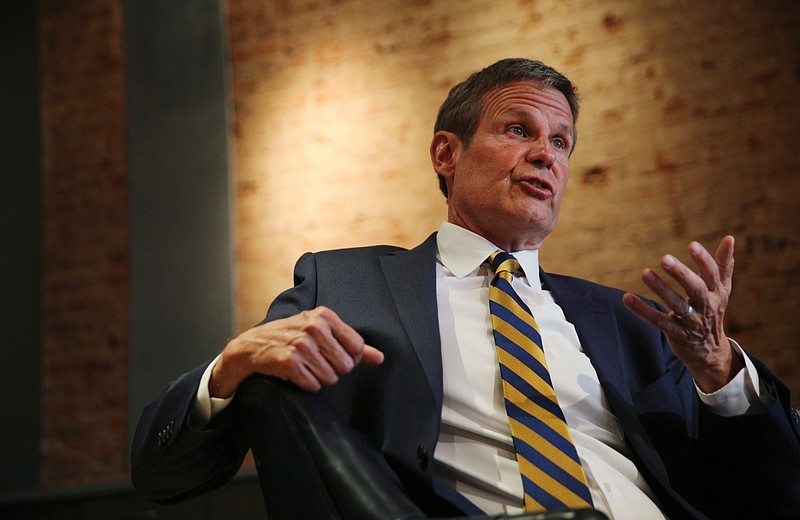NASHVILLE - Political newcomer Bill Lee captured Tennessee's Republican gubernatorial nomination Thursday, emerging as the victor in a brutal four-person primary race that shattered spending records as GOP candidates collectively burned through more than $45 million.
The Associated Press called the race for Lee, a Franklin businessman who defeated U.S. Rep. Diane Black of Gallatin; Knoxville businessman and former Tennessee commissioner of economic and community development Randy Boyd; and state House Speaker Beth Harwell of Nashville.
"Today is a victory for Tennesseans who want an outsider, for people who want Tennessee not only to be an even better place to live for six and a half million people, but for Tennessee to lead the nation," Lee said in a statement. "Tonight, we celebrate, but tomorrow we get back to work. We're going to finish this campaign the way we started it: 95 counties in 95 days. Thank you for believing in us."
Lee now faces Democratic nominee Karl Dean in the Nov. 6 election to succeed the term-limited Republican Gov. Bill Haslam who is winding up his second four-year term. Dean bested state House Minority Leader Craig Fitzhugh of Ripley in Democrats' primary.

View our 2018 Voter Guide
Unlike many states such as Georgia, which require victors to win by more than 50 percent, Tennessee only requires the top candidate in multi-candidate contests to win by one more ballot than their nearest competitor.
Democratic Governors Association Executive Director Elisabeth Pearson blasted Lee in a statement, calling him a "shady businessman who is pushing a divisive social agenda that threatens the state's economy."
She said Lee "would bring job-killing discrimination bills to Tennessee and would waste taxpayer dollars on expensive legal battles to defend his far-right policies. Lee's business record is marred by ethics questions, alleged discrimination against a veteran by his company, and shady deals."
In a state where outsider President Donald Trump won the GOP primary in 2016 before carrying the state in the general election, all four major nominees aligned themselves with Trump to varying degrees, none more so than Black. She was endorsed by Vice President Mike Pence.
But it was the folksy, soft-spoken Lee who described himself as a "man of faith" who won. He began the contest in 2017, knowing little about most issues and calling himself the "conservative outsider" as well as a business owner and farmer. And he also had a highly personal story to tell about the death of his first wife in a horse-riding accident.
That, Lee said, had inspired him to "work to change others, to make life better for other people," not only at his family owned Lee Company building and construction services firm but in public service.
But while Lee sometimes stumbled initially on issues during candidate forums, he knew enough to retain Chris DeVaney of Lookout Mountain, a former Tennessee Republican Party chairman and one-time aide to another folksy Tennessean, the late Republican U.S. Sen. Fred Thompson.
In one ad, Lee, 58, spoke directly into the camera, saying, "People ask me all the time, 'What do you believe?' Let me tell you. My relationship with Christ is the most important thing in my life. That will never change."
Early in the race, the front-runners were Black and Boyd. Like Lee, Boyd was a first-time candidate who was a successful entrepreneur and had advised Haslam on his Tennessee Promise free community college program and later served as Haslam's economic and community development commissioner.
As the race tightened, Black and Boyd began attacking each other. Left untouched were Lee and Harwell. Their support rose, Lee's by a wider margin. Alarmed, Black and Boyd attacked Lee. He responded in an ad charging they were "dishonest" attacks and a "great example of what's wrong with politics."
In the final stages of the campaign, independent expenditure groups popped up attacking Lee. One last-minute attack came from a political action committee, funded by two of Black's supporters, called Fight for Tennessee.
It featured Robert J. O'Neill, a retired Navy SEAL and part of the team that killed terror leader Osama Bin Laden in 2011. He pointed to a 2009 lawsuit filed by a Tennessee National Guard member who alleged he was wrongfully fired by Lee's business because of repeated military deployments.
Lee's company had denied any wrongdoing, saying the dismissal was part of a general layoff.
Lee put in personal funds of $5.2 million, much of it through self-made loans, of the total $7.05 million he spent.
Boyd, who made a fortune in pet products, put in at least $19.4 million in personal funds out of the total $21.07 million spent. Black, who along with her husband founded a Tennessee-based pharmaceutical company, threw at least $12.2 million of her own money into her total $13.83 million effort, according to late July disclosures. Harwell of Nashville put in $3.1 million in a combination of personal loan guarantees, transfers from House campaign committees and contributions.
Contact Andy Sher at asher@timesfreepress.com or 615-255-0550. Follow on Twitter @AndySher1.
